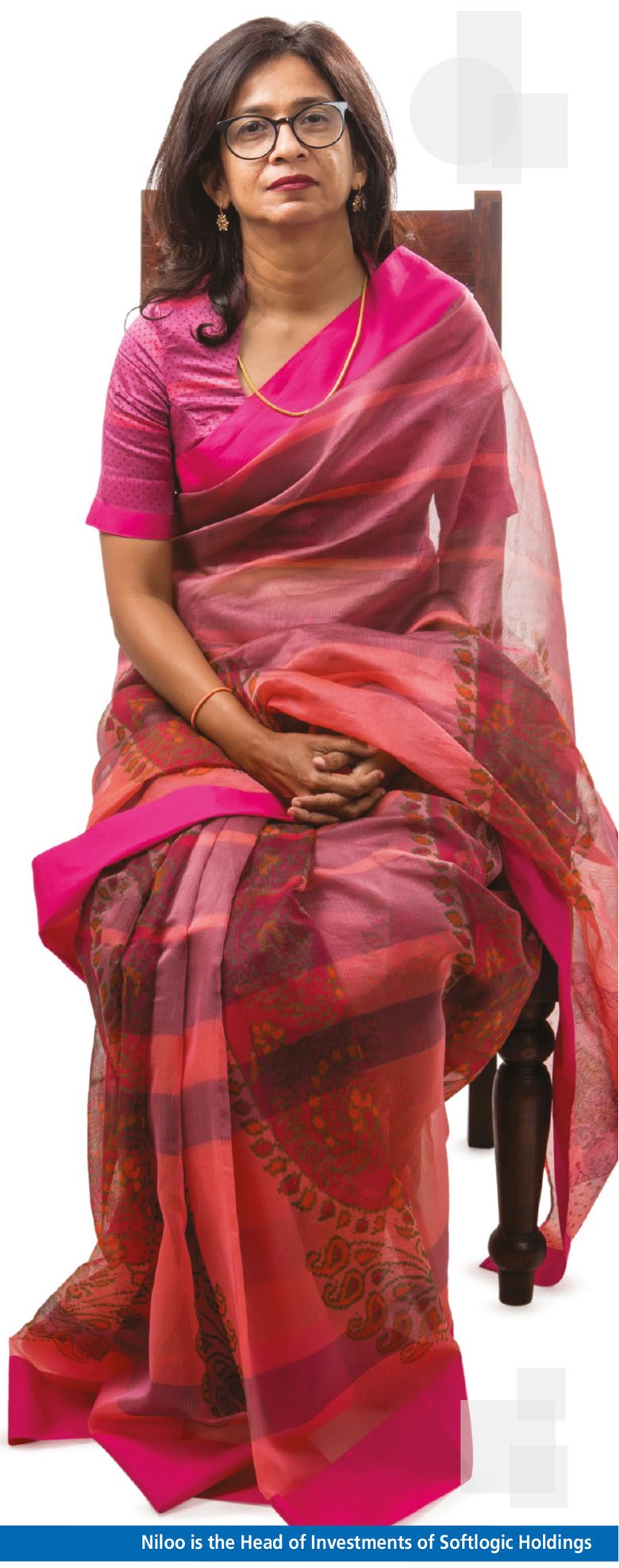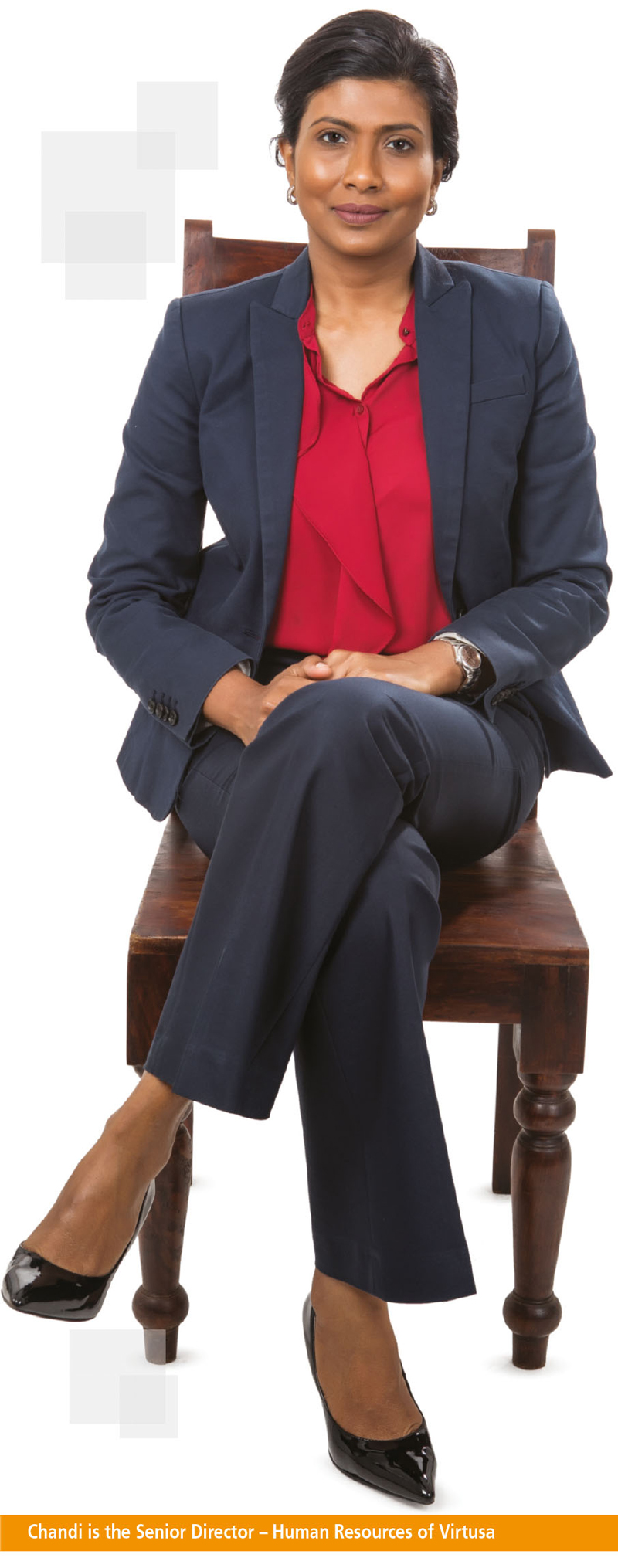WOMEN IN BUSINESS
Compiled by Savithri Rodrigo

Q: How do you view the business climate from a female entrepreneur’s perspective?
Niloo Jayatilake (NJ): The biz climate in Sri Lanka is challenging for any entrepreneur irrespective of gender. In addition, an inefficient and complex bureaucracy is often a barrier for startups and SMEs alike – and this discourages entrepreneurship.
Chandi Dharmaratne (CD): While there are many government and nongovernmental organisations working to provide business development services, more public-private partnerships are required to support this cause. Greater opportunities for women to participate locally and gain overseas exposure would motivate them to grow their businesses.
Q: Are there challenges that women in business continue to face?
NJ Society at large remains male dominated or even chauvinistic, which means women have a harder time – although gender bias has decreased over the last decade.
CD Regardless of the country, societal expectations of women are fundamentally the same and deeply gendered. Amidst this pressure, most women strive relentlessly for perfection in their multiple roles and this impossible goal of being perfect limits them from having it all.
Q: Do you believe that women are supported to maximise their potential?
NJ No. Although there is equal opportunity at the entry level, this lessens considerably in the upper echelons of the corporate structure.
CD Progressive organisations offer equal opportunity to both genders with numerous initiatives provided for women to stay in the game. However, it is imperative that male leaders also sign up to, believe in and take accountability for the diversity agenda.

Q: How do you view women’s representation in the public and private sectors?
NJ Sri Lanka made history with the world’s first woman prime minister. The state sector has witnessed numerous women holding high office including state banks as much as in civil society where professional women have been hugely successful. However, the same cannot be said of opportunities in the private sector especially on corporate boards, which exhibit extreme gender inequality.
CD There is great scope for improvement. Even as the economy expanded, female labour force participation in Sri Lanka declined from 41 percent in 2010 to 36 percent in 2016. Sri Lanka has the 14th largest gender gap in terms of labour force participation globally.
Q: Do Sri Lankan businesswomen have the potential to go global?
NJ Yes. There are many such women entrepreneurs – for instance, IronOne Technologies’ cofounder Lakmini Wijesundera with her innovative BoardPAC solution, which is now used in over 50 countries.
CD There are many truly global organisations in Sri Lanka, some of which count Fortune 500 companies as their clients. Women in these organisations are functioning on a global platform, and meeting international standards and expectations. Sri Lankan women are equal to or better than their counterparts in the global arena.
Q: Which sectors hold the most promise for female workers returning to the country?
NJ I would like to see them in roles that involve higher value addition. The state should facilitate and encourage them to invest their saved capital in SMEs – and then assist them with gaining knowledge and skill sets, and provide softer funding mechanisms.
CD ICT, wholesale and retail trade, financial services, telecommunications, real estate, tourism, education and healthcare. The services sector will
be the growth driver of the future.
Q: What role do SMEs play in facilitating businesswomen?
NJ They are very important. In the SME business model, lending is based on cash flow funding rather than collateral based facilities. The state must step in to structure a form of lending that encourages more women towards SMEs as addressed in Budget 2018.
CD The SME sector accounts for 52 percent of GDP, 45 percent of employment and 75 percent of the total number of enterprises. But only 10-25 percent are owned by women. Hence, the SME sector has the herculean task to groom businesswomen, empower women entrepreneurs, and strengthen initiatives to provide them with access to credit, market linkages and relevant training.
Q: Whom do you consider as being role models for women in business?
NJ In the global arena, Chairwoman and CEO of PepsiCo Indra Nooyi; locally, Marianne Page and Priyani Ratnagopal who work in a male bastion, single-handedly promoted the local capital market to foreign investors and marketed Sri Lanka to some of the world’s largest fund houses, managing billions of dollars in the last 30 years.
CD There are many inspirational role models, each with something unique to draw from. Their ability to differentiate themselves, practise humility, commit to society and focus on their journey has been remarkable.
Q: How crucial is it for women to assert themselves as valuable members of the business world?
NJ Women often bring different perspectives when analysing issues or problems. They have also been found to be somewhat tougher mentally when faced with a challenge and quicker in decision making.
CD This cannot be emphasised enough. Apart from the obvious reasons of elevating themselves and their families, both economically and socially, Sri Lanka’s human resource potential must be maximised by increasing the number of working women.
Q: What can organisations do to address the loss of women employees at the mid-career level?
NJ Mentoring, and opportunities to develop leadership skills and tackle tough areas such as negotiations and promotions, place women in a better position to progress through the mid-career drop-off and into leadership.
CD Inclusive cultures boosted by flexible working hours, work from home options, crèche facilities, non-discriminatory policies, including men in the gender diversity agenda and transparent communication platforms provide equal opportunities to get to the top. This should be strengthened by a zero tolerance policy of sexual harassment in the workplace.
Q: So what is your vision for businesswomen in Sri Lanka?
NJ They must eschew conventional thinking, ignore the negative mindset of what a woman’s place in Sri Lankan society should be and break the mould.
CD More women must be recognised in the highest echelons of decision making in Sri Lanka with men recognising women for their strength and diversity. Women should focus on their careers, have a strong voice, be confident about their capabilities, never compare themselves to others, be unique and strive to stay in the game.





Leave a comment